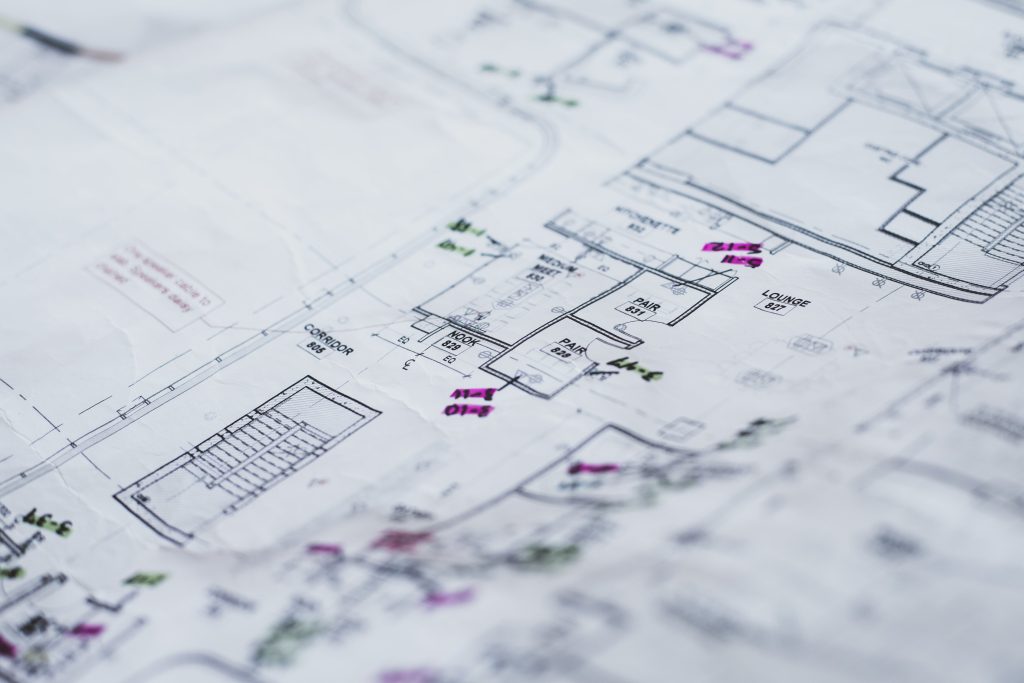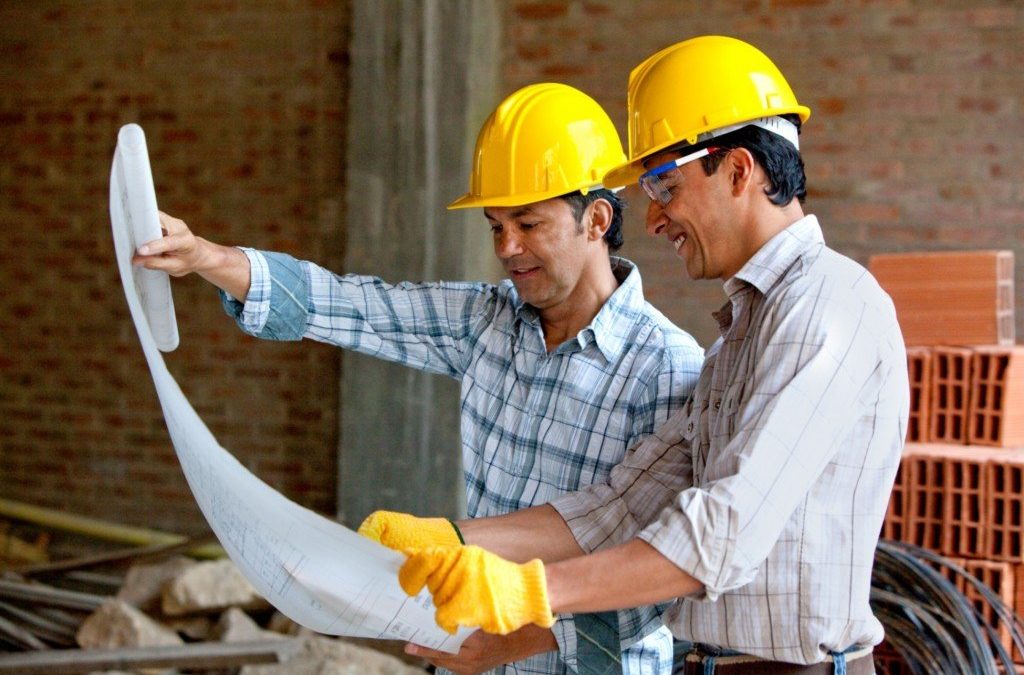You’ve finally saved enough money to start building your dream home. You may have looked at various house types and floor plans online, looked at fixtures and finishes, and built the home in your head.
Now it’s time to start looking for the perfect person to work with to make those dreams come true. A licensed architect can take your dream from the picture in your head to sketches to official drawings your contractor will follow to build.
Table of Contents
Who Will Build Your Home?
There are several ways you can design and build your dream home. You can gather your team individually, interviewing multiple candidates to fill all the roles required to complete your build, or you can opt for one-stop shopping.
Design-Bid-Build
With this model, you start with an architect or designer who listens and creates a design that will fit your needs, wants, and overall vision. You’ll work closely with them to create a floor plan, choose fixtures and finishes, and create a full plan for every step of your build. Once those plans have been created, your architect or designer will “put them out to bid” with multiple contractors. Those contractors will answer with detailed bids and plans for the completion of your project. After the contractor is selected, your architect or designer continues to work closely with you and the contractor to make sure the project stays on track and is built to plan.
Note: your architect or designer will have worked with multiple contractors. They can offer advise on which ones deliver the best work, are communicative, don’t cut corners, etc. and those you should steer clear of. When interviewing contractors, make sure your architect or designer sits in on the meeting and take their post-interview feedback into account.
Design-Build
Save time by cutting out the bidding process. Hiring a design-build firm can mean 1) all services are done in-house or 2) the firm works with contractors they have vetted and done business with on several occasions. In the latter example, your architect or designer will have multiple recommendations for contractors they know do good work for reasonable prices. You won’t necessarily have to scour the internet for builders’ association or Better Business Bureau reviews to narrow down your list.

Integrated Project Delivery
This type of project delivery method, IPD, is a method that seeks the efficiency and involvement of all project participants – people, systems, business structures, practices, etc. – from project start to project completion. The team works together through design, fabrication, and construction. IPD aims to increase productivity, reduce waste, avoid time overruns, enhance final product quality, and reduce conflicts between team members including owners, architects/designers, and contractors throughout construction. Waste is defined as resources spent on activities that do not add value to the end product. One of the highlights of IPD is its emphasis on technology to facilitate communication between parties.
The primary team members include the architect or designer, key technical consultants as well as a general contractor and subcontractors. IPD represents a return to the “master builder” concept in building where the entire building team (including the property owner, architect or designer, general contractor, building engineers, fabricators, and subcontractors) work collaboratively throughout the construction process.
Interview Multiple Contractors
Just as you did with your architect or designer, you’ll want to interview multiple contractors. You want someone you can work and communicate with throughout the process, as well as one who meshes with the rest of the team you’re building. If your architect or designer and contractor don’t work well together, your project could be full of pitfalls caused solely by these two key players being unwilling or unable to work together toward a common goal: a new home for you.

Make sure to have your architect or designer sit in on these interviews. They’ll help advise help you evaluate each candidate after the interview. Your architect or designer can explain some things and point out red flags you may not know about. For example, a low bid may mean they cut corners, are having financial difficulty and looking to score a job quickly, or worse – they plan on winning the bid and then immediately create several change-orders creating a pile of paperwork and more fees that end up costing more overall than the highest bidder.
General Contractors
General contractors (GCs) will be the main point of contact for you and the go-to person when it comes to communicating your needs and wants. They’re the professionals who construct your home. They acquire permits, materials, and oversee subcontractors. GCs take an architect or designer’s plans and implement them. Your GC will schedule the project in stages and organize and employ subcontractors to keep things running smoothly – on time and on budget.
Your GC will likely have a list of subcontractors they have worked with and vetted, so you won’t have to sit an interview every single subcontractor working on your home.
Project Managers Vs. Construction Management Companies
Hiring a GC can be costly. Project managers and construction management companies charge a fee, often less than a GC, to oversee the construction process. Independent project managers are typically local and can provide on-site, boots-on-the-ground services. On the other hand, construction management companies may be national corporations with limited personnel in any given area. Here’s what you can expect from each:
| Project Manager | Construction Management Company |
|---|---|
| On-site management every step of the way | Remote assistance with some on-site supervision |
| Hires subcontractors | Hires subcontractors |
| Acquire materials | Offer finance options |
Custom Home Builder
Acipe Design is a custom home design-build firm. We design and build one-of-a-kind homes to our clients’ specifications on the client’s property. During an initial consult, we’ll discuss the size of home you want, floor plan, amenities, fixtures, and finishes. We’re with you every step of the way, from site preparation to the first time you turn the key to call it home.
A custom home builder who is not part of a design firm will take the designer or architect’s plans and implement them from start to finish. Like Acipe Design, these builders have a network of subcontractors they work with to get your project through to completion on-time and on-budget.
How Much Will It Cost?
Part of the interview process is finding out how much the builder charges for their services, and how those costs are broken down. The cost will of course depend on several factors, including materials, labor, and more. Choose a contractor who provides a detailed list and is able to explain the reasoning behind each number. Their fee will part of that estimate, too. During your initial consult and any follow up, Acipe Design will lay out the cost, and negotiate a payment schedule to keep work moving at a steady pace.

Ask Questions
There are no stupid questions. As a client, you’re likely not well-versed in what goes into building a home. Otherwise, you’d do it yourself, right? While you’re not asking your contractor to “show you how the sausage is made” you need to ask key questions to make sure you’re working with the right person. First and foremost, is asking for references – and checking out every single one. Other important questions to include are:
- Do you guarantee your work? What kind of warrantee do you offer?
- How do you determine allowances? (Allowances are amounts for various fixtures and finishes a contractor will set to keep the budget from going wild)
- What type of materials do you use? Ask about the type of wood they use for framing, whether or not they use steel in any cases, types of plumbing pipe, etc. There are pros and cons to every type of material, but some materials are better in certain situations and environments.
- Will you hire a professional for delicate procedures like laying tile?
- There are a number of other questions to ask, both generally and questions specific to your project. No matter what, get everything in writing! Signed contracts, text messages, and emails aren’t just a form of communication, they also provide proof and serve as reminders of things discussed and agreed upon.

Expertise & Professionalism
Contractors are licensed professionals. Things do come up that may slow or halt work and a good contractor knows how to pivot and change the schedule so work can continue. A large snowstorm during a Michigan winter can keep interior crews from reaching the jobsite and completing projects, or a sweltering Arizona desert summer will limit working hours due to the heat. Your contractor knows how to navigate these problems, take them into consideration when preparing a proposed timeline and budget, and more with professionalism and grace. Your contractor should be able to work together with all of the subcontractors, the architect, designer, and you.
Final Thoughts
Contractors are the ones who turn your dreams into a reality. No matter how you obtain your contractor, they need to fit your personality and project. Now that you know a little more about how to find and work with a contractor, you can take this knowledge and find the person or firm ideal for you and your needs.
Contact us today!

